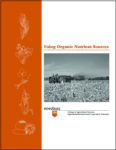The educational materials listed on this page are about Nutrient Management.
A nutrient management plan is used to manage the application of plant nutrients and soil amendments. Integrated nutrient management may include utilizing variable rate application, soil inoculants, microbial inoculants, biologicals, foliar feeding and proper fertigation techniques and fertigation systems. An understanding of nutrient cycling can also aid in budgeting and supplying nutrients for plant production, while minimizing soil and water pollution. Farmers can harness the power of the nitrogen cycle by using organic fertilizer and manure to supply plant nutrients. Careful nutrient management can also improve the overall condition of soil, especially if your plan includes cover crops. Key practices include biological inoculants, nutrient cycling, fertigation, organic fertilizers, reduced applications, foliar feeding, municipal wastes, cover crops.
Building Soils for Better Crops, a book offered by SARE, helps farmers navigate ecological soil management strategies. A useful bulletin, Smart Water Use on your Farm or Ranch, addresses the role of water in a farm system and in nutrient management. The Season Extension: Fertility Management Topic Room helps producers gain knowledge of effective and proper fertility management techniques, including fertigation, to improve nutrient cycling on a farm. What is Sustainable Agriculture? provides information on best practices the encourage the stewardship of land, water and air resources.
Showing 1-7 of 7 results
How Alive is My Soil?
This guide presents soil testing methods that can be performed in the field by farmers, gardeners, or anyone who desires to understand and appreciate soil from a different perspective. While these tests aren’t intended to be a replacement for sending soil to a lab, they can be considered complementary to annual or biannual lab analysis.

Cover Crops for Soil Health Workshop
All session recordings and slide presentations from this three-day professional development workshop are available online. Hosted by Northeast SARE and Delaware State University in March 2016, this event addressed the latest research on the benefits and successful management of cover crops in grain, vegetable and animal production systems.

Crediting Cover Crops and Soil Organic Matter in a Variable Rate Nitrogen Fertilizer Prescription
Crop growth depends on available nitrogen (N) in the soil, much of which comes from mineralization of soil organic matter and other organic residues, such as cover crops. The amount of mineralized N available to a crop depends on several biological and environmental factors such as temperature, moisture, soil texture, the total quantity of organic […]

New technology for improving nitrogen management in corn
A multi-state Research and Education project, led by Cornell University’s Aaron Ristow and Harold Van Es, aimed to enhance nitrogen (N) management in corn acreage by calibrating a new tool, Adapt-N, and educating farmers about nutrient management. Adapt-N is a cloud-based computer tool that provides precise N fertilizer recommendations that account for seasonal weather conditions […]

Adapt-N Training Manual
Adapt-N is an online tool that helps precisely manage nitrogen (N) inputs for grain, silage, and sweet corn production. It can provide automatic daily updates of each field’s N status and recommendations, based on real-time weather influences, and can be used with any device with internet access.

Simple P Test Yields Millions in Savings
John Maxwell, a Geneseo, N.Y., dairy farmer, used to apply more than 60 pounds of phosphorus per acre when planting his 250 acres of corn. But after participating in a SARE-funded, statewide research project aimed at helping growers fine-tune their use of starter phosphorus fertilizers, he has reduced that to about 20 pounds per acre, […]

Whole-Farm Nutrient Planning for Organic Farms
A 16-page booklet that helps organic farmers understand their soil test results and use these results wisely and compliantly, within the USDA National Organic Program standards.